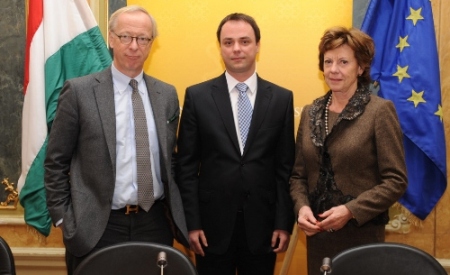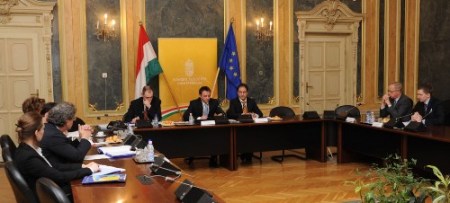[@ 11.01.06.] Yesterday, Minister of State for Infocommunications Zsolt Nyitrai, representing the Hungarian EU Presidency, Neelie Kroes, EU Commission Vice-President responsible for the Digital Agenda, and Gunnar Hökmark, the European Parliament’s chief rapporteur for spectrum met in Budapest to discuss the EU’s most immediate legislative dossier in telecoms, the proposed Radio Spectrum Policy Programme.

The participants agreed that more spectrum should be made available to foster a rapid increase in broadband deployment, particularly in remote areas, and that a smart and coordinated approach to the use of spectrum across the EU was essential.
The representatives of the three EU institutions discussed the key elements of the proposal for a Spectrum Programme, and its timing, and agreed that considerable progress is needed during the Hungarian EU Presidency. They will collaborate closely and constructively to adopt a Programme that creates the conditions for the wide deployment of wireless broadband and other spectrum-based services across Europe for the benefit of European citizens and business.

„Spectrum is a key dossier of the Hungarian ICT presidency programme. I will make the necessary efforts to broker a deal between the various points of view within the Council, with the Parliament and the Commission, and to take account of the views of stakeholders. We need to strike the best balance between actions at EU level on radio spectrum policy and the management activities carried out at Member State level in order to provide Europe with the necessary instruments to compete on the global telecoms scene” – Nyitrai underlined.
Vice-President Kroes added: „the Radio Spectrum Policy Programme can make sure that wireless broadband provides the necessary complement to fixed Infrastructure in meeting our broadband for all targets. It can also create the conditions for industries and services using spectrum to introduce innovative technologies and services that will promote social participation in the internet era and will foster economic growth and strengthen Europe’s competitiveness. I welcome the clear recognition by the Parliament and the Council Presidency of the importance of rapidly adopting this Policy Programme so that EU citizen’s can benefit as quickly as possible.”
„Europe must be ambitious and create the right framework for a sustainable growth of wireless communication services. Global leadership in the digital economy is crucial for prosperity and competitiveness of the European Union and my vision is that spectrum will act as a spearhead for achieving a competitive Single Market. In my role as the European Parliament’s rapporteur, I will work to ensure that Europe has the highest capacity and internet speeds to stimulate new services, innovation and economic growth” – Hökmark stressed.
Background
Radio spectrum is a resource of tremendous economic, societal and cultural value, as it is the basis for the provision of important services such as mobile communications, wireless broadband, broadcasting, navigation, public safety, etc. Radio spectrum is a property of the Member States, which, where appropriate, should be managed in a coordinated manner.
The Commission presented in September 2010 a legislative proposal to the European Parliament and Council to establish a multiannual Radio Spectrum Policy Programme (RSPP) setting out policy orientations and objectives for the strategic planning and harmonisation of the use of spectrum. Spectrum policy initiatives are a key element of the Digital Agenda for Europe and of the Europe 2020 strategy for smart, sustainable and inclusive growth.
The proposal for the first RSPP, aims to establish a five-year policy programme to promote efficient radio spectrum management and, in particular, to ensure that sufficient spectrum is made available by 2013 for wireless broadband, thereby helping the EU to fulfil its commitments in the Digital Agenda for Europe to give every European access to basic broadband by 2013 and fast and ultrafast broadband by 2020. During the Belgian Presidency, the Council produced a progress report and also discussed the file in detail at its meeting on 3 December 2010, while the European Parliament held a first exchange of views on the proposal in the ITRE Committee on 9 December 2010.
For further information, please visit:
Commission’s proposal:
Council progress report:
